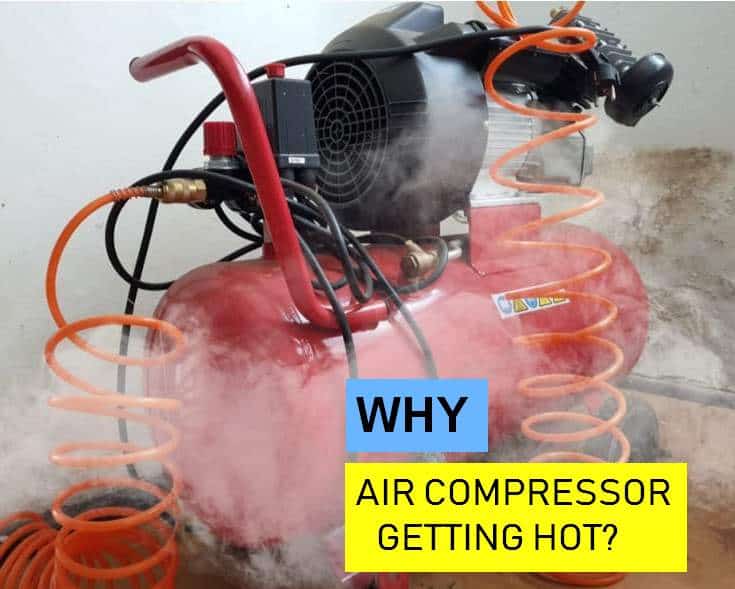Why’s Air Compressor Getting Hot & How to Prevent Overheating

An air compressor is a must-have item for every workshop, small fabrication, and even the household. This is true, especially if you enjoy doing DIY projects.
If you’ve just purchased a compressor, you’ve likely got a lot of questions. Is it true, that if your compressor is getting hot, it means something is wrong with it?
It’s quite normal for an air compressor to get hot from time to time, especially if you’re using it for a long time, or it’s unusually hot outside.
If your air compressor, on the other hand, seems unusually warm, it is most certainly overheating. It’s critical to understand the difference between normal heating and overheating.
You need to know why’s air compressor getting hot and how to prevent it from overheating. You also need to learn the basics of how an air compressor works.
Applications of Air Compressor
When it comes to air compressors, there are many purposes that they can be used. One of the most popular applications of an air compressor is in automotive use.
Many use an air compressor in their garage in order to power and utilize various tools and equipment. This can include things such as tire inflation, brake bleeding, and engine starting.
Another popular use of air compressors is for powering pneumatic tools. Pneumatic tools are powered by compressed air, which makes them a great choice for heavy-duty applications. The pressure increase can be used to power tools such as pneumatic wrenches, hammers, and drills, or to run an air-conditioning unit.
Air compressors can also be used for a variety of other purposes in houses, such as cleaning, painting, and even simple welding. In the end, how you utilize your air compressor will depend on your specific needs and requirements.
What Happens If an Air Compressor Gets Too Hot?
When an air compressor overheats, there are several things that can happen to the compressor.
- The motor will overheat. When this happens, the motor will shut down to protect itself from further damage. Once the motor has cooled down, it can be restarted. However, if the motor continues to run when it is too hot, it will eventually burn out.
- The compressor’s mechanical metal parts can overheat, causing them to seize and fail. This can cause the compressor to break down or even explode.
- The valves can melt. When the valves melt completely, the compressor will not be able to function properly. However, if they are only damaged but not completely melted, they can be fixed and the compressor can be repaired.
- Finally, the high temperatures can damage the compressor’s seals and gaskets, which can lead to leaks. All of these things can cause serious damage to the compressor and potentially be dangerous for those around it. The compressor must be taken apart to fix them. This involves removing all the compressor’s parts and replacing them.
How Do You Know if Your Compressor Is Overheating?
There are a few key things you can check to determine if your compressor is overheating. One of the most obvious signs is a rise in the ambient temperature around the compressor. If you notice an increase in the temperature, it could be a sign that the compressor is working too hard and is in danger of overheating.
You want to shut off the compressor and let it cool down for about 30 minutes. Once it’s cooled down, restart the compressor and see if it still overheats. If it does, then you know that your air compressor is overheating.
Another sign to watch out for is abnormal noise coming from the compressor. If you hear any loud noises or rattling, it could be a sign that something is wrong, and the compressor may be overheating.
Finally, pay attention to any changes in performance. If your compressor seems to be working harder than usual or isn’t cooling as effectively as it used to, it may be overheating.
Why Is Air Compressor Getting Hot?
Compressors generate a lot of heat. Heat is produced by the friction that happens when air molecules are pressed together in a confined space. The hot air is then directed into a compressor receiver through the compressor pump head. When this happens, some inside components can get hot as well.
That heat has to go somewhere, and in this case, it’s being dissipated into the surrounding air and into inside components.
The hotter the compressor gets, the more friction is created. The more heat is dissipated until, eventually, the compressor will reach its maximum operating temperature. At that point, the compressor will no longer be able to convert power into compressed air.
Because of this, many manufacturers recommend that the compressor’s maximum operating temperature should never exceed 40 degrees Celsius (104 degrees Fahrenheit).
To avoid burning yourself, we recommend that you avoid touching the sections of the compressor that are hot. When your air compressor is running, don’t leave any materials on top of it. This is to avoid fire hazards when materials come into contact with hot metal.
How to Prevent an Overheating Air Compressor?
It’s critical to understand what defines regular behavior for your air compressor. If your air compressor starts acting strangely or producing weird noises, you will learn what is most likely, or be able to pinpoint something is wrong.
If you’ve just bought a brand-new air compressor, things are a little different because you haven’t had a chance to familiarize yourself with it yet. On the other hand, if your air compressor has been with you for a long and is suddenly heated in a way it has never been before, something is wrong.
Below is some area where you have to pay attention to prevent the air compressor from overheating. If your air compressor behaves out of normality, these are the common causes you should check first.
1. Electrical Problem (Cord, Sharing Outlets)
An electrical problem outside the air compressor may cause a compressor to overheat. For example, a short in the electrical wiring can create a lot of heat and lead to an overheated compressor.
The air compressor machine will not operate correctly if the cord is shared with other high-amperage equipment. In this case, the cord could not deliver enough power to run the compressor properly. There is a possibility that is just not strong enough to ground the machine.
2. Overused and Overloaded Air Compressor
As previously said, if your air compressor’s ‘duty cycle’ isn’t exceeded and the heat you’re experiencing isn’t extreme, your air compressor isn’t likely to overheat. What happens, though, if it hasn’t achieved its duty cycle yet and the engine seems particularly hot?
Here are some tips for avoiding overuse and overload of your air compressor, hence preventing it from overheating:
- Use the air compressor for shorter periods of time instead of running it continuously. Use the compressor in 10-15 minutes, if working continually.
- Take breaks in between uses to allow the compressor to cool down. This will also extend the life of the compressor.
- Only use the compressor for the tasks it was designed for. Don’t try to use it to do the job of a power drill, saw, or other tools.
- Make sure the compressor is properly sized for the tasks you’re using it for.
3. The Pump is low on Oil lube
As we now know, the friction of those air molecules inside the compressor produces heat. The heat together with the air is transmitted via the pump head and tubing.
The heat itself is expected. However, if it feels burning to the touch and isn’t normally so hot, there might be a problem inside the pump. You need to lube up the pump
The compressor pump should be well oiled at all times. If you haven’t examined this in a while, the oil within the compressor pump is probably old.
In order to keep your air compressor running in top condition, it is important to keep the pump lubricated. The pump can be lubricated with light oil, such as 3-in-1 oil. You will need to remove the plug on the side of the pump and pour in a small amount of oil. Replace the plug and run the compressor for a few minutes to distribute the oil.
4. Failing Capacitor
A capacitor is a device used to store electric energy. In an air compressor, the capacitor is responsible for storing electrical energy and releasing it in a burst to start the compressor. It provides a burst of power that gets the motor up to speed. Once the motor is running, it can provide power to the compressor on its own.
If the capacitor fails, it will not be able to start the motor. This can cause the compressor to not run or to run at a reduced speed. If this happens, you may need to replace the capacitor.
An air compressor motor is far more expensive and difficult to replace than a capacitor. As a result, we recommend that you keep a careful eye on your capacitors and replace them as soon as they begin to fail.
Do you have any idea what a capacitor looks like? This video explains what they are and why they might not be operating correctly.
5. Thermal Valve Issues
Overheating can occur if a thermal valve begins to fail.A spare thermal valve is always a good idea to have on hand in case of an emergency and to make sure your business doesn’t suffer any downtime.
The spare valve may also be used to compare your present valve to check if it’s still in excellent working order or if it needs to be changed as a preventative maintenance step.
6. Poor Air Ventilation from Surrounding
Air compressor poor ventilation from surroundings can be a serious problem. If the closing area is not cool enough, the air compressor may overheat. The air compressor will be impacted if the room where it is housed has insufficient ventilation or no air movement.
The compressor pulls in air from the surrounding environment and pressurizes it to create compressed air. It will effectively increase the temperature of the air within the compressor, which is already high due to compression friction.
This can lead to component failure and even an explosion.
To avoid these hazards, make sure the air compressor machine has enough area to breathe and is kept in a cool environment. Avoid putting the air compressor up against a wall or another item.
The compressor should be located in a well-ventilated area, and there should be plenty of room around it for airflow. If possible, the compressor should also be located outdoors where it can draw in the fresh air.
Conclusion
Air compressors can get hot for a variety of reasons. You should be able to differentiate between normal hot or overheating. It’s crucial to keep a basic understanding of how your air compressor works.
You also need to record and take note of anything abnormal when the overheating happens. So that if anything strange occurs, you can thoroughly check and avoid further overheating.
There are several reasons why air compressors get hot or overheating. The main reason was that the compressor is being overused and overloaded. Other reasons can include electrical problems, leaks in the system, poor ventilation, or low oil levels. If your air compressor is getting hot, you should take steps to diagnose and fix the problem.






